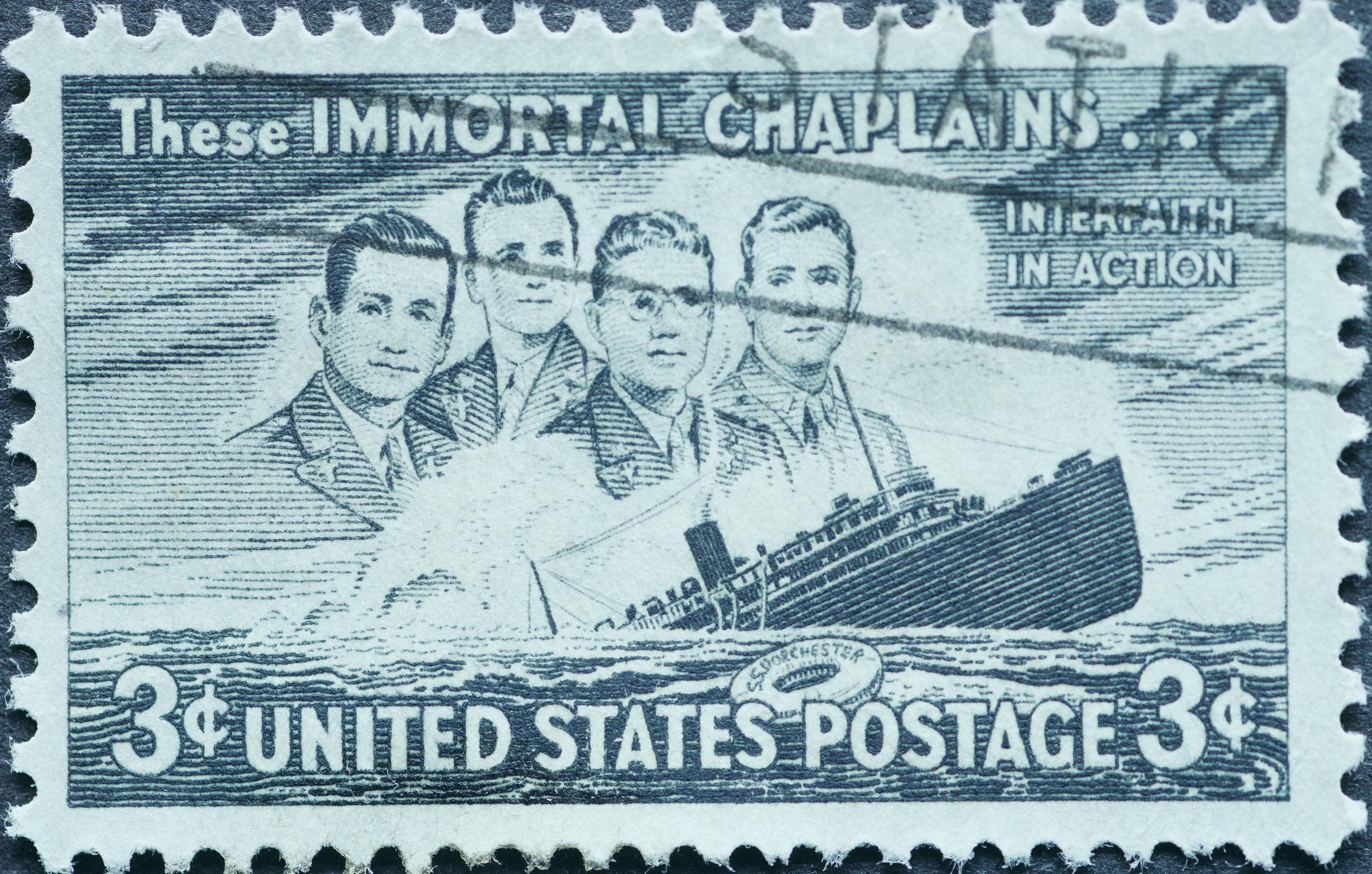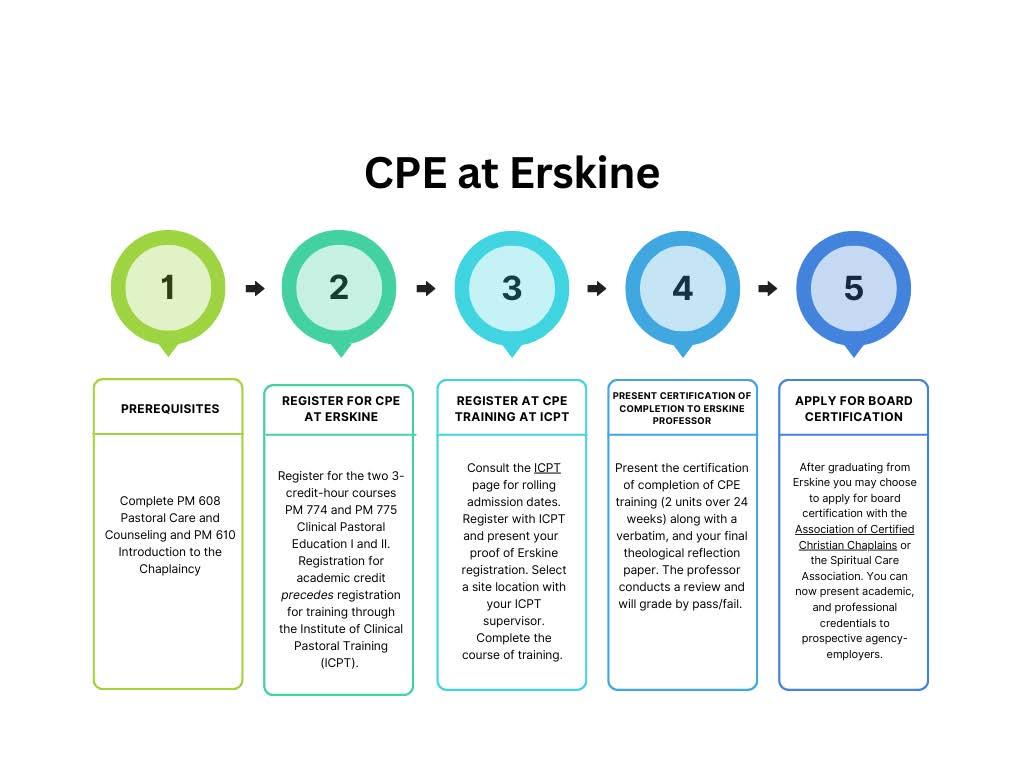CPE@ERSKINE
Clinical Pastoral Education





Bethesda Publishing for Erskine Theological Seminary 09 December 2022
This paper seeks to introduce students, faculty, and staff, as well as candidates, to Clinical Pastoral Education (CPE) at Erskine Theological Seminary (hereafter, “Erskine”). We intend for inquirers to read this document to understand CPE, CPE at Erskine and know how to register for the CPE program at Erskine.
Candidates and students should check with admissions or their professor for any changes to information in this document.
Michael A. Milton, PhD Director of Chaplain Ministries Distinguished Professor of Missions and Evangelism Erskine Theological Seminary
Erskine offers CPE academic credit through a partnership with the Institute of Clinical Pastoral Training (ICPT), in association with the Association of Certified Christian Chaplains (ACCC) and the Spiritual Care Association (SCA). The Erskine CPE experience allows students to exercise the principle of “cooperation without compromise,” that is, to minister in the name of Jesus Christ, according to their Christian convictions and confessional commitments, alongside others who may (and usually do) hold different convictions. This environment encourages our students to practice faithful Gospel witness in a pluralistic age. CPE at Erskine means you can train without suspending your conscience and faith. Erskine students also enjoy fully accredited CPE training with multimodal teaching and learning (a hybrid of online and on-site), allowing students to complete training in their place of ministry or other approved locations without having to move. Moreover, along with the prerequisite courses at Erskine, students graduate with a Chaplaincy concentration, prepared academically and practically to assume duties at one of the many growing chaplaincy sectors.

Clinical Pastoral Education (CPE), awarded in units, is the internationally recognized certification required for clergy to perform ministry in several institutional settings. CPE involves dual registration with, firstly, Erskine Theological Seminary (for graduate academic credit) and, secondly, the Institute of Clinical Pastoral Training (for a multimodal teaching and learning experience that involves supervised ministry at an approved area of ministry with weekly synchronous classes within a cohort; ICPT awards the CPE units which Erskine transcribes to 6 credit hours). Students may then apply for board certification through the Association of Certified Christian Chaplains (and counselors) or “ACCC.” Board certification is not necessary to earn credit at Erskine. However, students desiring to serve in certain chaplaincy sectors may be advised to apply for board certification after graduating from Erskine Theological Seminary.
PM 774-PM 775 Clinical Pastoral Education (6-credit hours) (PM 774-775 CPE requires the following pre-requisite Erskine courses: PM 608 Pastoral Care and Counseling, and PM 610 Introduction to the Chaplaincy) is the official CPE academic credit course at Erskine Theological Seminary. The course involves two consecutive 12-week semesters (800 hours, of which 600 is documented as a ministry of presence with the “parishioner” (the “patient,” “inmate,” “Soldier,” Veteran;” and 200 hours is in didactic and reflection, i.e., lectures, supervised theological reflection, and peer-to-peer dialogue) culminating in competency-based examinations (exams are taken until the students demonstrate mastery) that measure knowledge and praxis to standards and stated outcomes.
The courses PM 608 Pastoral Care and Counseling, and PM 610Introduction to the Chaplaincy, along with PM 774-775 Clinical Pastoral Education (6 credit hours, 2 CPE units) not only satisfy the program requirements for a Chaplaincy concentration in professional graduate education at Erskine
Theological Seminary but allows students to graduate with credentials to serve in the major chaplain ministry sectors (e.g., Armed Forces, Veterans Administration).
Clinical Pastoral Education (CPE) is the nationally and internationally recognized certification for pastoral care and counseling training, especially for those serving as chaplains and pastoral counselors in institutions. Institutional sectors include (but are not limited to) military, state, and federal civil service, Veteran care, healthcare, first responders, industrial, corporate, and incarceration.
CPE is taught (and practiced) using competency-based education (CPE), in which candidates must demonstrate proficiency in graduated standards before advancing to the next level of training. CPE is also an evidence-based training program conducted under a certified supervisor within a cohort. Using verbatim (i.e., a written, student-generated detail memorandum of a pastoral event), didactic material (e.g., reading, lectures), and theological reflection (a weekly 3-5 pages paper in which the student identifies a presenting issue of the most recent pastoral event, writes a critical assessment of the use of “self” in the event, seeks biblical-theological insight on the presenting issue, and synthesizes variables to arrive at a pastoral application or lesson that supports spiritual and professional formation, and can be of encouragement to others), students consider the place of “self” in spiritual assessment, diagnosis, and spiritual guidance of “parishioners.” CPE incorporates praxis, peer-to-peer, and supervisor-to-cohort forums for ministry evaluation.
We will quote from our partner in on-site training, the Institute of Clinical Pastoral Training (ICPT):
ICPT offers CPE to spiritual professionals and theological students seeking professional growth and development in clinical pastoral settings. CPE students learn through action-reflection instructional methods and supervised practice in real-world settings to provide pastoral services to persons in crisis.
At ICPT, students engage in hybrid learning which blends both on-site and interactive distance learning modules.
The CPE training program includes various methods of didactic and applied learning:
Students participate in 100 hours of didactic lectures offered live and via interactive distance learning (IDL).
Students journal their learning in weekly Reflection Reports which depict significant experiences with patients and thoughts about ministry.
Students prepare Case Studies that outline interactions with patients or counselees.
Students engage in weekly one-on-one Coaching/Supervisory Sessions with experienced CPE Supervisors. The weekly sessions allow students to receive personalized instruction, guidance and mentoring. Sessions may be conducted live or via interactive distance technology such as Zoom or Skype.
Students participate in interactive Peer Reviews where they discuss their work and the work conducted by their classmates. Peer review in the CPE program provides opportunities for students to expand their perspectives and to collaborate with interdisciplinary teams.
CPE students partake in 300 hours of supervised Clinical Training at their current place of ministry or any number of settings, including but not limited to; hospitals, hospice houses, corporate settings, prison systems, skilled nursing facilities, nursing homes, assisted living facilities, and community organizations.1
Clinical Pastoral Education as a professional standard arose in the mid-twentieth century as Christian clergy, and
“Certification,” Association of Certified Christian Chaplains (blog), accessed December 8, 2019, https://certifiedchaplains.org/
membership/certification/
denominational judicatories recognized a growing need for specialization in ministry to healthcare institutions. The 2 movement grew under the auspices of one agency. In the first decade of the new millennium, at least two other significant institutes and credentialing agencies appeared, the Association of Certified Christian Chaplains and Counselors (ACCC) and the Spiritual Care Association (SCA). The countermovement arose out of a concern for several issues, most significantly, the older agency’s hesitancy to embrace multimodal education, particularly a hybrid of online and on-site. Secondly, Chaplains, candidates, and supervisors began to be concerned about a growing intolerance for evangelical Christian theology.
Erskine Theological Seminary was a leader in helping to form the Institute of Clinical Pastoral Training, which offers CPE in a hybrid format. Additionally, Erskine Seminary recognized the Association of Certified Christian Chaplains (ACCC) as a preferred accrediting agency (along with SCA). The Institute and ACCC (and SCA) are now fully accredited by the Department of Education, the DOD, and the Department of Veterans Affairs. This recognition opened the door for other institutions.
There are four steps taken in sequence (5 if you want to apply for board certification):
Take your prerequisite Erskine courses: PM 608 Pastoral Care and Counseling and PM 610 Introduction to Chaplaincy. Both courses are offered as 8-week modules through Erskine Online. Register with Erskine for PM 774-775 Clinical Pastoral Education (for academic credit).
For more on the history of CPE, see, e.g., Homer L. Jernigan, “Clinical Pastoral Education: Reflections on the Past and
Future of a Movement,” Journal of Pastoral Care & Counseling 56, no. 4 (2002): 377–92.
Enroll in the next CPE training cohort through the Institution of Clinical Pastoral Training (ICPT). Present your certificate of completion, a verbatim, and final theological reflection paper to the Erskine CPE Supervisor and professor of record.
If you desire, you are ready for board certification through the Association of Certified Christian Chaplains (ACCC).
ACCET.org. “Accrediting Council for Continuing Education and Training (ACCET).” Accessed December 8, 2019. https://accet.org/.
Association of Certified Christian Chaplains. “Certification.” Accessed December 8, 2019. https://certifiedchaplains.org/membership/certification/.
Gore, R.J., editor. Seminary Catalog: Erskine Theological Seminary. Vol. 2020–21. Due West, SC: Erskine College and Theological Seminary, 2019.
Jernigan, Homer L. “Clinical Pastoral Education: Reflections on the Past and Future of a Movement.” Journal of Pastoral Care & Counseling 56, no. 4 (2002): 377–92.
Johnson, Paul E. “Fifty Years of Clinical Pastoral Education.” Journal of Pastoral Care 22, no. 4 (1968): 223–31.
———. “Fifty Years of Clinical Pastoral Education.” Journal of Pastoral Care 22, no. 4 (December 1, 1968): 223–31. https://doi.org/10.1177/002234096802200406.
King, Stephen DW. “Trust the Process: A History of Clinical Pastoral Education as Theological Education.” Reflective Practice: Formation and Supervision in Ministry, 2007.
LaRocca-Pitts, Mark. “The Association of Professional Chaplains: 75 Years of Growth and Excellence.” Journal of Pastoral Care & Counseling 75, no. 3 (2021): 171–78.
O’Connor, Thomas St James. “The Search for Truth: The Case for Evidence-Based Chaplaincy.” In Professional Chaplaincy and Clinical Pastoral Education Should Become More Scientific: Yes and No, 185–94. Routledge, 2013.
The End.